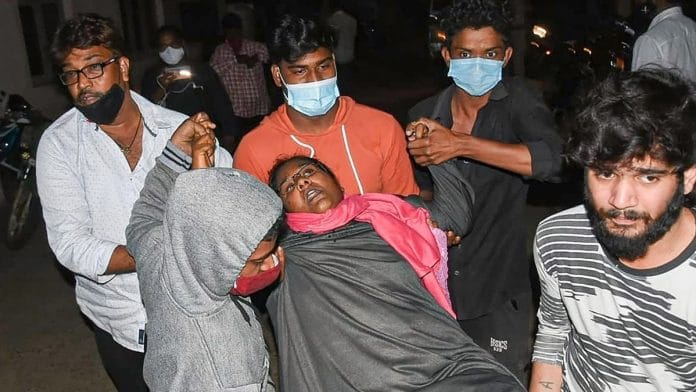Hyderabad: A fortnight after a “mystery” illness struck Eluru, a town in Andhra Pradesh’s West Godavari district, which has killed one person and left 600 people hospitalised so far, experts said residues of pesticides found in vegetables and blood samples could be the reason for the unknown disease.
However, they added that the exact reason can be ascertained only after analysing for a “few months” samples of food, drinking water and vegetables consumed by the residents of the town.
In a video conference with CM Y.S. Jagan Mohan Reddy Wednesday, experts from AIIMS, Delhi, World Health Organization (WHO), Indian Institute of Chemical Technology (IICT), National Institute of Nutrition (NIN), National Institute of Virology (NIV), and Centre for Cellular and Molecular Biology (CCMB), among others, stressed on the need to find out how the pesticides entered the human body.
AIIMS experts, who are analysing both blood and water samples, said that “organochlorine” was the reason for the illness in patients and pesticides could be the reason for the presence of organochlorine, which might have entered the human body in the process of food cycle, said a statement from the chief minister’s office.
Bhaskar Katamneni, state Health Commissioner, said the IICT also found presence of “organochlorine” in the blood samples.
Organochlorine pesticides are synthetic pesticides known for high toxicity, slow degradation and bioaccumulation. Several compounds belonging to organochlorine have been reportedly banned in some developed countries.
AIIMS had earlier reported that lead was detected in blood samples and nickel was found in all the milk samples, added the statement, issued Wednesday.
“They (AIIMS) said lead was found in blood samples of relatives of patients and long-term study is needed on it. Exact reason for the illness would be known after analysing samples of food, drinking water and vegetables, for a few months,” said the statement.
Meanwhile, the NIN experts said that residues of pesticides were found in the samples of tomato and brinjal, and these pesticides could be the reason for the illness.
Also read: There’s a zoonotic viral disease in south India and it peaks every summer
No lead, nickel, pesticide found in water samples
Experts from IICT, which tested 21 samples of water, along with blood samples of people and animals, said there were no traces of heavy metals like lead, nickel and arsenic in water samples, and also pesticides residues were not found in any water samples, the CMO statement said.
However, the team pointed out that endosulfan and DDD pesticide were traced in blood samples of patients. Lead was found in some blood samples, but no traces of ‘organophosphates’ were found.
National Environmental Engineering Research Institute (NEERI), which analysed underground water and surface water, said all metals are in permissible limits except mercury.
The concentration of mercury is high in underground water compared to surface waters and it could be due to solid waste burning, NEERI experts said.
Both CCMB and NIV ruled out the possibility of the presence of bacteria or virus, or a viral infection after conducting tests.
A team from the World Health Organization has also been deployed to help ascertain the reason for the “mystery” illness.
The statement also said the CM ordered that drinking water samples from all sources in all the districts should be tested.
He also said that organic farming should be encouraged and awareness should be created on the same among the farmers. The agriculture department should focus on withdrawing harmful pesticides from the market, he added.
How it all started
Earlier this month, the Government Hospital in Eluru had hundreds of patients hospitalised overnight with symptoms of seizures, vomiting, dizziness, etc.
District authorities had told ThePrint earlier that “similar” cases were reported last month too.
“Starting November last week to 4 December, there were about a total of 20 cases with similar symptoms in other hospitals, mostly private. Since each hospital had only one or two such patients, they were treated and sent back home. It was hard to see it as a pattern because these one or two cases were dismissed off as standalone cases,” West Godavari District Coordinator for Health Services Dr A.V.R. Mohan had told ThePrint.
Also read: Disunity, lacklustre poll show, defections — Telangana Congress on continuous downslide mode






